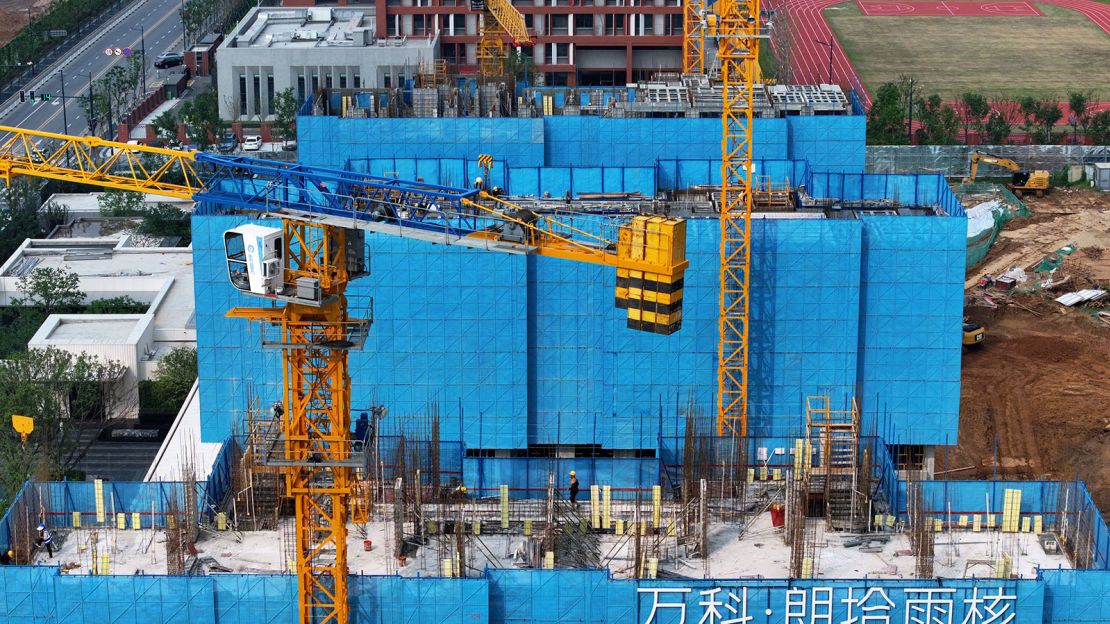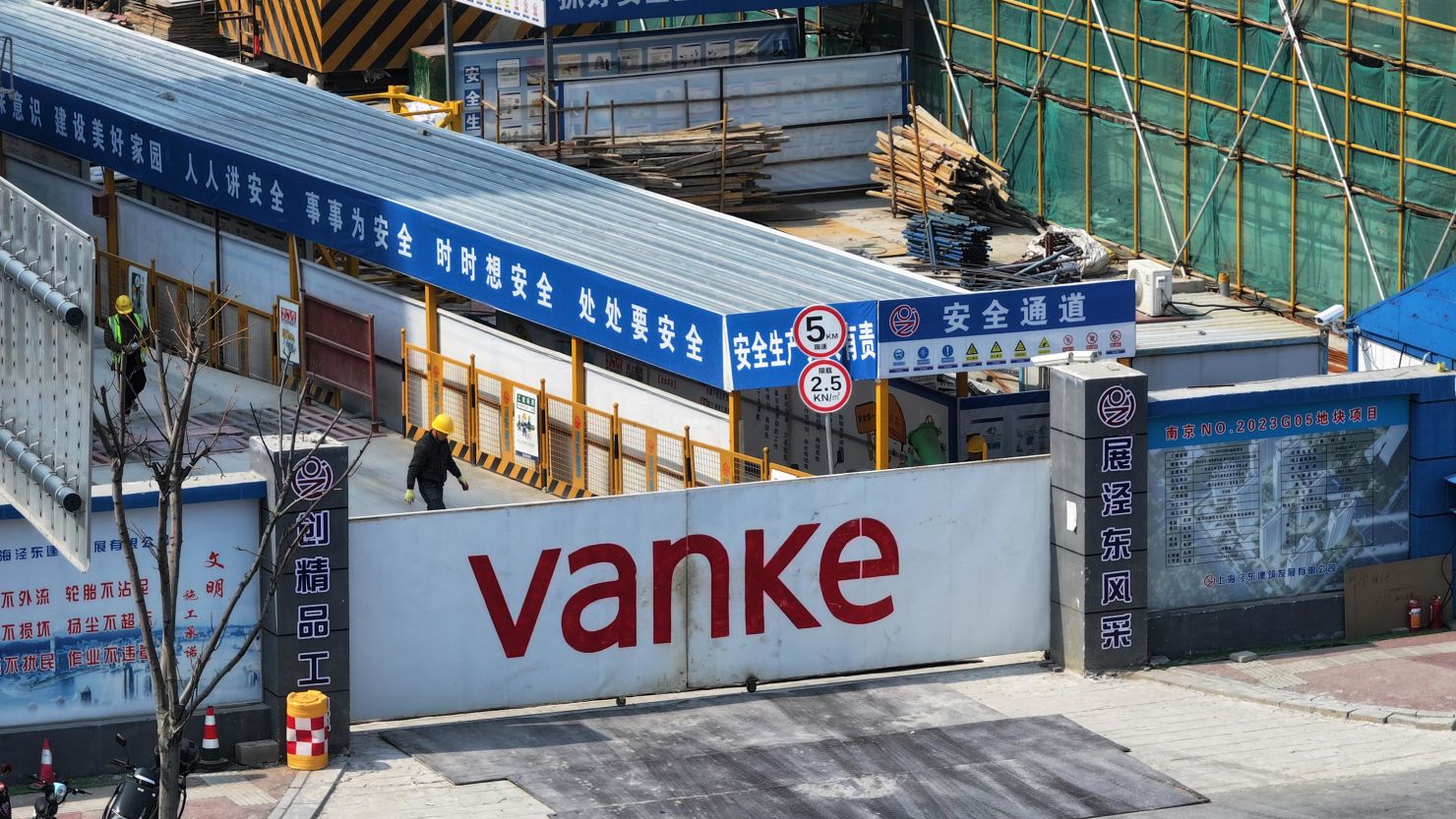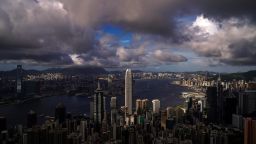Editor’s Note: Sign up for CNN’s Meanwhile in China newsletter which explores what you need to know about the country’s rise and how it impacts the world.
Chinese banks are reportedly scrambling to bail out one of the country’s biggest property developers after its credit rating was downgraded to “junk” status by Moody’s on Monday.
Beijing has been struggling to restore confidence in the country’s ailing real estate industry and appears to be working flat out to prevent China Vanke going the way of Evergrande and Country Garden, which both defaulted on their debts and are at risk of being liquidated.
Chinese state media reported Tuesday that 12 major banks, including the six largest state-owned lenders, were in talks to provide a syndicated loan for Vanke worth as much as 80 billion yuan ($11.2 billion) to enable the company to meet upcoming repayment deadlines.
The provision of the loan is still uncertain, state media outlet Cailianshe reported, citing an unnamed source close to the potential deal. Another state media outlet, the Economic Observer, reported that several insurance companies have sent teams to Vanke’s headquarters for a new round of debt negotiations in a bid to avert a default. CNN has reached out to Vanke for comment.
Founded 40 years ago, Vanke was the country’s second largest developer by sales last year but it has been hammered by the collapse in demand for apartments and the slump in home prices.
Vanke’s stock soared in Hong Kong and Shenzhen following the reports of potential new financing. On Tuesday, its Hong Kong-listed shares ended up 10.3%, while the Shenzhen-traded stock closed 5.7% higher. But they are still in negative territory so far this year.
On Monday, Moody’s cut Vanke’s rating to Ba1, which is often referred to as a junk rating. That means the company needs to offer a higher yield on its bonds to compensate for the greater risk of payment default that bond investors are taking on.
“The rating actions reflect Moody’s expectation that China Vanke’s credit metrics, financial flexibility and liquidity buffer will weaken over the next 12 to 18 months because of its declining contracted sales and the rising uncertainties over its access to funding amid the prolonged property market downturn in China,” Kaven Tsang, a senior vice president at Moody’s said in a press release.
Other international ratings agencies S&P and Fitch have kept Vanke’s ratings at investment grade.

Founded in 1984 in Shenzhen, Vanke is a flagship company in China’s property sector. Its founder Wang Shi is considered the “Godfather” of the industry and was likened to Donald Trump by Time magazine. It was the first listed property company in mainland China, boasting a high-profile IPO in 1991 on the still-nascent Shenzhen Stock Exchange.
In 2017, in order to fend off a hostile takeover bid by a Chinese activist investor, the company let the Shenzhen government step in as its top shareholder. Currently, 33.4% of Vanke is owned by Shenzhen Metro, which is controlled by the city, according to Refinitiv Eikon.
Before its cash crunch became public late last year, the company was one of the few developers that had been considered financially sound by international rating agencies.
Moody’s move reflects growing worries that toxic market conditions, including weak demand and a tough financing environment, in China’s property industry are dragging down even relatively healthy companies with solid state backing.
Vanke’s contracted sales declined 10% in 2023 to 376.12 billion yuan ($52.4 billion). In January 2024, its sales dropped by 32%.
Investors have been dumping Vanke’s shares in the past few months. Its Hong Kong-listed stock has lost nearly 30% since November. So far this year, it’s down 9%.
Beijing has been scrambling to fix its real estate crisis since 2021, when Evergrande, the world’s most indebted developer, defaulted on its international debt. The crisis subsequently spread, with dozens of major developers also failing to repay creditors. The fallout — which has undermined the confidence of homebuyers, businesses and investors — has threatened the broader economy.
The stimulus measures rolled out by Chinese authorities have so far failed to revive the sector. In 2023, property sales dropped 6.5% from 2022. Property investment fell 9.6%, the second straight year of decline.
Last week, Ni Hong, China’s housing minister, told reporters during the National People’s Congress that regulators will support the “reasonable” financing needs of real estate developers.
He reiterated a “whitelist” mechanism that was recently established to inject liquidity into the crisis-hit sector. More than 6,000 property projects across the country have been matched with development loans by banks.
But he also said Beijing will not bail out developers that are “seriously” in trouble.
“For real estate companies that are seriously insolvent and have lost their operating capabilities, [we should] let them go bankrupt or be restructured,” he said.
“We view the tone as negative,” Nomura analysts wrote on Monday. They said Ni has made clear that the government’s priority is to ensure delivery of property projects, not to protect the developers’ businesses.








